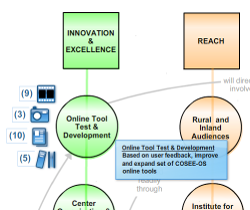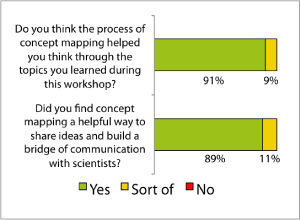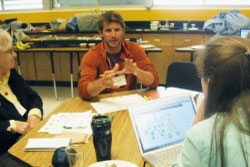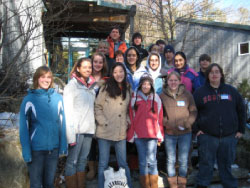Initiated in Fall 2005, the thematic COSEE-OS Center is now in a position to help others in the Network meet their goals. We have a portfolio of tested resources and invite interested Centers or others to discuss ways to collaborate. The COSEE-OS products and processes covered in this article include our online tools, transferrable workshop models, and publications. In other news, we are happy to welcome two new members of the COSEE-OS External Advisory Committee: D. Bob Gowin and Al Byers.
 |
Fig. 1 Number and type of assets shown
attached to a concept map |
Online Tools
Cycles of development, testing and user feedback have allowed COSEE-OS to develop innovative software tools that keep pace with the growing needs of scientists and educators. Version 1.2 of the Ocean Climate Interactive and Concept Map Builder was released in mid-2008. It included the ability to save, share, and print custom concept maps. Version 1.5 allowed users to search the COSEE-OS database and save a library of assets that could be linked directly to concepts. As new features have been implemented, the reach and use of the tools have increased. In April 2010, COSEE-OS software tools had 886 registered users who had created over 2,100 concept maps.
Specific recommendations on how to improve our software tools have been provided by over 200 participants in COSEE-OS workshops and other programs. Many of these recommendations have been implemented in the newly released Version 1.6. The following new features are included:
- Asset previewing: The ability to see the number and type of assets (i.e., images, videos, news, teaching resources) that are attached to a concept in both the Concept Map Builder and Ocean Climate Interactive (see Fig. 1)
- Map Linking: The ability to link maps to other existing maps through concepts
- OCI previewing: A preview that displays what a map will look like when presented in the Ocean Climate Interactive
- Improved formatting of concepts (including text formatting without HTML coding)
- Ability to duplicate objects (concepts, lines, phrases)
- "Undo" capability
Early user feedback on the new software has been positive, and COSEE-OS will continue to test and refine the tools in the future through its workshops and other programs. Please visit the COSEE-OS Tools page to learn more.
 |
| Fig. 2 Evaluation results for SEC workshops |
Transferrable Workshop: Scientist-Educator Collaborative (SEC) Model
COSEE-OS has a proven workshop model to help improve communication between educators and scientists. Evaluation results (Fig. 2) indicate that our Scientist-Educator Collaborative (SEC) workshops have helped participants better communicate through consensus-based concept mapping. Over a one-year period (November 2008 - October 2009), each of the 102 educators who applied to participate in SEC workshops were familiar with concept mapping; however, only one of the 20 SEC scientists had previous experience with the technique. This prompted COSEE-OS to include half-day scientist training sessions to prepare them for focused concept mapping with educators. Such professional development is a rarity, given that scientists’ traditional role in such workshops is limited to delivering content.
COSEE-OS has also developed a quantitative measure of pre- and post-workshop changes in educators’ levels of comfort with and sense of relevance of the Ocean Literacy (OL) and Climate Literacy (CL) Principles (National Geographic Society et al., 2005; NOAA et al., 2008). Overall, there was a net positive change for the 16 principles addressed by SEC scientists: e.g., individual educators went from being comfortable with a principle before a workshop to very comfortable afterward. For all OL and CL principles covered, 58% to 89% of educators had a positive change. Nine principles showed positive change from 75% or more of educators. In SEC workshops, scientists also learn about the rigorous quantitative processes developed by COSEE-OS to match their research with educators’ needs based on OL and CL Principles.
 |
Fig. 3 SEC workshop held at CalPoly
with COSEE-Pacific Partnerships |
COSEE-OS recently took advantage of an opportunity to transfer its SEC workshop model elsewhere in the network through a collaboration with COSEE-Pacific Partnerships. PI Shawn Rowe and Program Coordinator Coral Gehrke contacted COSEE-OS to help them to run the SEC workshop with a cadre of informal educators. OS also worked closely with Heidi Schmoock, who will teach Communicating Ocean Sciences to Informal Audiences at California Polytechnic State University (CalPoly) at San Luis Obispo this winter. The workshop was held at CalPoly May 24-26, and included a group of 5 CalPoly scientists (Nikki Adams, Paul Choboter, Mark Moline, Lisa Needles, and Lars Tomanek) and 15 informal educators from the region, some representing marine sanctuaries (
Fig. 3). About half of the participating educators were docents, including those from an institution that has a memorandum of understanding with CalPoly with the goal of infusing more ocean and marine research into its programs. COSEE-OS staff members Carla Companion and Medea Steinman traveled to California to co-facilitate the event. As a result of this successful workshop at CalPoly, COSEE-Pacific Partnerships is planning to use the SEC model in at least one of their Summer 2010 workshops. To facilitate other COSEE Centers that may be interested in running the SEC model, COSEE-OS has been systematically documenting the process of working with partners to plan and execute the SEC model. To learn more visit the
COSEE-OS Workshop pages. Please contact
Annette deCharon if you would like to discuss the possibility of using COSEE-OS training in preparation for holding one of these workshops in your region.
Transferrable Workshop: Faculty-Graduate Student Model
The COSEE-OS workshop model has also been used to help graduate students become better educators. Three COSEE Centers - California, NOW, and West - have agreed to replicate the COSEE-OS workshop model with faculty and graduate students, broadening the pipeline impact to include more scientists-in-training. The first Faculty-Graduate Student workshop was held at the University of Maine Darling Marine Center (DMC) January 29-February 2. Scientists included David Fields and Benjamin Twining (Bigelow Laboratory for Ocean Sciences), Peter Jumars and Larry Mayer (DMC), and Andrew Pershing (Gulf of Maine Research Institute).
 |
| Fig. 4 Waterville Senior High School students pose for a group shot before touring the DMC |
A total of 17 graduate students and post-docs participated in the event. A culminating session included presentations to educators and students from Waterville Senior High School (
Fig. 4). Linda Duguay (COSEE-West), Cheryl Peach (COSEE California), and Sage Lichtenwalner (COSEE NOW) co-facilitated the workshop in preparation for holding their own in-person or online versions during the 2010-11 academic year. Most graduate students (94%) thought the process helped them think through the topics learned in the workshop. They gave a rating of 6.9 for
quality of interaction with faculty out of possible 7 on a Likert scale.
At the concluding session of the workshop, the graduate students were brimming with interest in learning more about pedagogy. On June 2, a follow-on focus group reunited about half of the graduate students and post-docs who participated in the workshop to collect more information on their needs for further pedagogical training. This online session was also used to clarify some of their evaluation feedback data and demonstrate software updates that were implemented based on their recommendations. Members of the COSEE External Advisory Committee - including new members D. Bob Gowin and Al Byers (see below) - will work with COSEE-OS to explore how these young scientists might leverage existing programs to improve their pedagogical content knowledge. To learn more visit the COSEE-OS Graduate Student / Faculty Collaborative Workshop page.
Publications
To help transfer COSEE-OS products and processes to the Network and beyond, results of COSEE-OS activities are regularly published in COSEE Network News (CNN) and in education and scientific journals: Oceanography (Karp-Boss et al., 2007 and 2009); EOS Transactions, American Geophysical Union (deCharon et al., 2009); Current: The Journal of Marine Education (COSEE-OS, 2007; Strang et al., 2007); and The Earth Scientist: Journal of the National Earth Science Teachers Association (deCharon, 2010). To learn more visit the COSEE-OS Publications page.
External Advisory Committee (EAC)
COSEE-OS has recently expanded its EAC to include two new members whose expertise will aid in efforts to better evaluate and scale up its effective practices.
D. Bob Gowin is a renowned education researcher and author of several books on the use of pedagogical tools such as concept mapping (e.g., Novak & Gowin, 1984) and V diagramming in education. He is currently an Emeritus Professor at Cornell University, where he was on the faculty for 30 years, and also teaches continuing education courses at Stanford University as well as tutoring master’s students online, both locally and internationally.
Al Byers is currently the Assistant Executive Director of e-learning and government partnerships for the National Science Teachers Association (NSTA). He has successfully managed large-scale technology endeavors such as the NSF Webwatchers Program, the NSF International Polar Year Symposia and Web Seminars programs, and is serving as Co-PI on a third NSF grant leading NSTA’s meta-tagging initiative across all of NSTA’s professional development goods and services.
Please contact Annette deCharon if you are interested in learning more about the COSEE-OS EAC.
References
COSEE-Ocean Systems (2007), COSEE Centers: COSEE-Ocean Systems, Current: The Journal of Marine Education, 23, 34.
deCharon, A. (2010), COSEE-Ocean Systems: Collaborative mapping to clarify concepts in ocean observing, The Earth Scientist: Journal of the National Earth Science Teachers Association, 26(1), 29-30.
deCharon, A., J. Albright, C. Herren, A.H. Cline, and J. T. Repa (2009), Online tools help get scientists and educators on the same page, Eos Transactions, American Geophysical Union, 90(34), 289–290.
Herren, C., A. deCharon, J.T. Repa, A. Holt Cline, C. Companion, and D. Goodwin, (2010), Baiting the Hooks: Scientist-Educator team development through concept mapping and online tools, Eos Transactions AGU, 91(26), Ocean Sci. Meet. Suppl., Abstract ED33A-06.
Karp-Boss, L., E. Boss, and J. Loftin, (2007), Diffusion at work: an interactive simulation, Oceanography, Hands-on Oceanography, 20(3), 127-131.
Karp-Boss L., E. Boss, H. Weller, J. Loftin, and J. Albright (2009), Teaching physical concepts in oceanography: an inquiry-based approach, Oceanography Suppl., 22(3), 1-52.
National Geographic Society (2005), Ocean Literacy: The Essential Principles of Ocean Sciences Grades K–12. Brochure.
National Oceanic and Atmostpheric Adminsitration (2008), Climate Literacy: The Essential Principles of Climate Science Grades K-12. Brochure.
Novak, J. D. and D. B. Gowin (1984), Learning how to learn, 199pp., Cambridge University Press, New York and Cambridge, UK.
Repa, J. T., A. deCharon, and C. Herren (2010), Meeting Ocean Scientist’s Needs to Improve the Communication of Their Science Research: What COSEE-OS Has Learned, Eos Transactions AGU, 91(26), Ocean Sci. Meet. Suppl., ED24A-06.
Strang, C., A. deCharon, and S. Schoedinger (2007), Can You Be Science Literate Without Being Ocean Literate?, Current: The Journal Of Marine Education, 23(1), 7-9.

